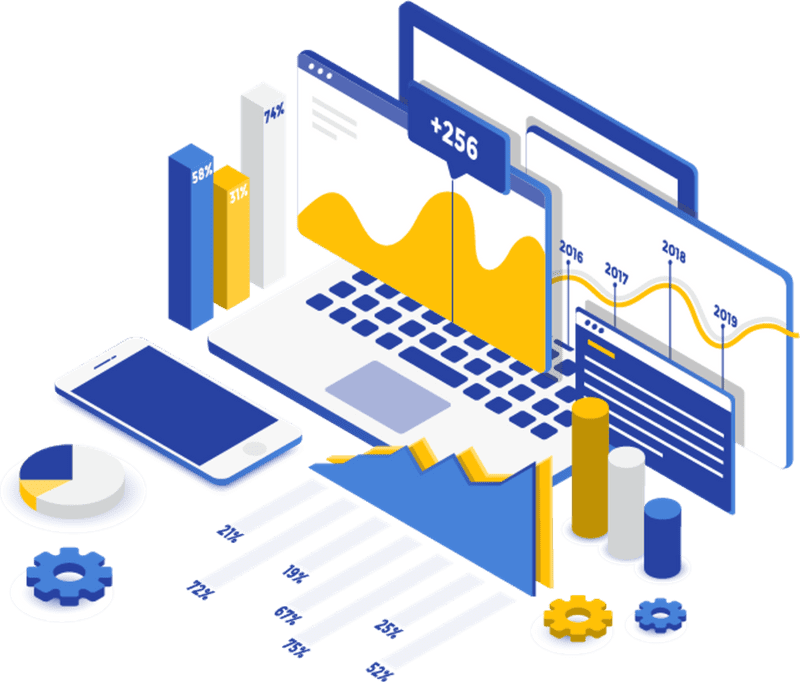Agile Robotic Process Automation
In Data Analytics , Our RPA development experts integrate standardized business processes with automation frameworks. We use cognition-based technologies like AI, matching learning to create high-functioning tools.

How We Can Help in Data Analytics ?
We focus on turning the available information into data, and data into result-driven insights. Our team brings more statistics that help you grow your business, sales, performance, and execution. By using powerful data technologies like BI, advanced analytics, data virtualization, and more, we assure your success. With the support of NLP and deep learning, take a leading edge over your competitors with us.

Our Data Analytics & Science Services
BI & Data Processing
- Data Warehouse Management
- Business Data Migration
- Intelligent Data Mining
- Data Redundancy Mitigation
- ERP Data Processing
Data Engineering
- AI-based data processing
- High-load product data engines
- Data Visualization
- Custom data report
Data Science Analytics
- AI-based data structuring
- Machine Learning processing
- Real-time Data Visualization
Digital Analytics
- Identify Buyers Persona
- Quantitative Marketing Strategy
- Social Media Reporting
- Web & Mobile Analytics
5 Big Benefits of Data and Analytics for Positive Business Outcomes
1. Proactivity & Anticipating Needs:
Organisations are increasingly under competitive pressure to not only acquire customers but also understand their customers’ needs to be able to optimise customer experience and develop longstanding relationships. By sharing their data and allowing relaxed privacy in its use, customers expect companies to know them, form relevant interactions, and provide a seamless experience across all touch points.
Thus, companies need to capture and reconcile multiple customer identifiers such as cell phone, email and address, to one single customer ID. Customers are increasingly using multiple channels in their interactions with companies, hence both traditional and digital data sources must be brought together to understand customers’ behaviours. Additionally, customers expect and companies need to deliver contextually relevant, real-time experiences.
2. Mitigating Risk & Fraud:
Security and fraud analytics aims to protect all physical, financial and intellectual assets from misuse by internal and external threats. Efficient data and analytics capabilities will deliver optimum levels of fraud prevention and overall organisational security: deterrence requires mechanisms that allow companies to quickly detect potentially fraudulent activity and anticipate future activity, as well as identifying and tracking perpetrators.
Use of statistical, network, path, and big data methodologies for predictive fraud propensity models leading to alerts will ensure timely responses triggered by real-time threat detection processes and automated alerts and mitigation. Data management alongside efficient and transparent reporting of fraud incidents will result in improved fraud risk management processes.
Furthermore, integration and correlation of data across the enterprise can offer for a unified view of the fraud across various lines of business, products, and transactions. Multi-genre analytics and data foundation provide more accurate fraud trend analyses, forecasts, and anticipation of potential future modus operandi and identification of vulnerabilities in fraud audits and investigations.
3. Delivering Relevant Products:
Products are the life-blood of any organisation and often the largest investment companies make. The product management team’s role is to recognise trends that drive strategic roadmap for innovation, new features, and services.
Effective data collation from 3rd party sources where individuals publicise their thoughts and opinions, combined with analytics will help companies stay competitive when demand changes or new technology is developed as well as facilitate anticipation of what the market demands to provide the product before it is requested.
4. Personalisation & Service:
Companies are still struggling with structured data, and need to be extremely responsive to cope with the volatility created by customers engaging via digital technologies today. Being able to react in real time and make the customer feel personally valued is only possible through advanced analytics. Big data offers the opportunity for interactions to be based on the personality of the customer, by understanding their attitudes and considering factors such as real-time location to help deliver personalisation in a multi-channel service environment.
5. Optimizing & Improving the Customer Experience
Poor management of operations can and will lead to a myriad of costly issues, including a significant risk of damaging the customer experience, and ultimately brand loyalty. Applying analytics for designing, controlling the process and optimizing business operations in the production of goods or services ensures efficiency and effectiveness to fulfil customer expectations and achieve operational excellence.
Advanced analytical techniques can be deployed to improve field operations productivity and efficiency as well as optimize an organisational workforce according to business needs and customer demand. Optimum utilisation of data and analytics will also ensure that continuous improvements are instigated on an on-going basis as a result of end-to-end view and measurement of key operational metrics.
For example, many organisations, inventory is the largest item in the current assets category – too much or not enough inventory can directly affect a company’s direct costs and profitability. Data and analytics can support inventory management by providing uninterrupted production, sales, and/or customer-service levels at minimum cost. The use of data and analytics can provide transparency into current and planned inventory positions as well as deliver insight into drivers of height, composition and location of stock and aid the determination of inventory strategy and decision making. Customers expect a relevant, seamless experience and for companies to know them wherever they engage.
Tools & Technologies We Use
Data Engineering






BI & Data Analysis






Data Analytics & Science Analytics






Digital Analytics






